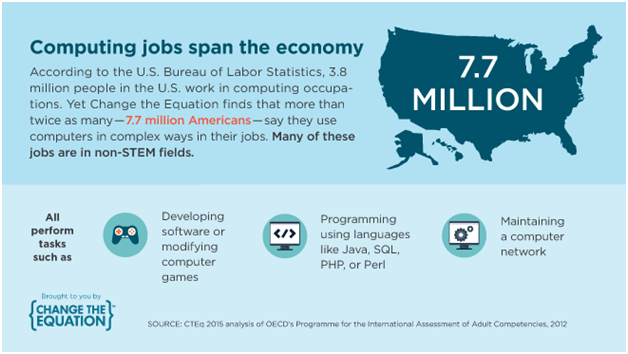This is a guest blog post by Claus Von Zastrow, the chief operating officer and director of research for Change the Equation.
If, like me, you worry that American students don’t get enough exposure to computer science in school, Education Commission of the States’ new review of Computer Science in High School Graduation Requirements should buoy your spirits. The report finds that more than half of the nation’s states are pursuing far-sighted policies to tackle this pressing challenge. Most notably, 20 states require school districts to count computer science credits towards math, science or foreign language requirements for high school graduation. That’s up from 14 states just one year ago.
Of course, we can hardly rest easy. For too long, computer science had been a neglected stepchild in discussions of education policy, and we are still suffering from the results of that neglect. Change the Equation’s recent analysis of federal data found that, in 2015, only 22 percent of high school seniors said they had taken a class in computer programming.
Lest you think these teens were simply apathetic, consider this: only 44 percent of them attended schools that offered computer science classes of any sort. It’s anyone’s guess whether those classes even covered programming. A meager 23 percent of seniors had access to gold-standard AP computer science classes. The nation’s low-income, minority and rural students face even worse odds.

Given how few students had the chance to take computer programming in their schools, we should probably be grateful for the 22 percent of 12th-graders who actually did take it.
States’ efforts aren’t coming a moment too soon, because the demand for computing talent is growing at a forceful clip. The Bureau of Labor Statistics (BLS) estimates that some 3.8 million people work in computing, and Economic Modeling Specialists, International projects that computing jobs will grow by 19 percent over the coming decade.
Change the Equation research suggests that these BLS figures may in fact understate the demand by a wide margin:

Millions of Americans whose job titles fall well outside the STEM fields write code, develop software or maintain computer networks on the job. Computer programming isn’t just for computer programmers anymore. States that rely on traditional job classifications to predict their need for computer talent may be missing half the story.
Still, state policies to make computer science count towards graduation are a decisive step in the right direction. There is little incentive for students to take computer science, or for schools to offer it, as long as the course remains a mere detour on the road to high school graduation. Incentives to take the course are especially important for girls and students of color, who are woefully underrepresented in the computing fields.
Some states, like Arkansas, are taking things a step farther by requiring high schools to offer computer science, and their efforts have started to pay off with higher enrollments in the subject. More states may follow suit.
It is no easy matter to guarantee every American high schooler access to computer science classes. Doing so will require a massive effort to adopt standards, adapt curriculum, train teachers and outfit schools with the right technology. Thanks to a diverse group of state policymakers, business leaders and nonprofit organizations leading the charge, however, we have real cause for optimism.










